7 best freelance contract templates for any service
Ready to sign your first client? Here are seven different freelance contract templates you can use to make sure you don't run into any issues.

Last year was my first full year as a freelancer. And guess what? I made more than my previous 9-5 job.
It wasn’t easy though. There were many hurdles I had to overcome — finding clients, creating proposals, sending contracts, delivering work on time, making sure invoices were paid, etc.
But, as I look back, most of the things I thought were “problems” were just limiting beliefs I had about myself. Growing up in a household where entrepreneurship wasn’t really advocated, running my freelance business felt like spiritual warfare. I had to unlearn a lot about what I thought it meant to work and have a “stable” job.
The one thing that did help me though was that I knew a lot of people were successful at freelancing. If others could do it, so could I. And so could you. As cheesy as that sounds.
When I signed my first client, I knew I wanted to make the client experience so great that I would be the best freelancer this startup has worked with.
But I knew nothing about legal stuff and how to actually kick off and start a project. So, I looked around for a freelance contract template that I could use. It looked perfect and I used it to start my first client project. Thankfully, nothing went wrong with that project. However, I’ve heard enough horror stories from both clients and other freelancers to know that you need to provide yourself with protection for the marginal cases that do go wrong.
In this article, I’ll share some of the best freelance contract templates for a variety of service-based businesses.
Do I need a contract for freelance work?
While freelance working arrangements are more fluid than traditional work, that freedom shouldn’t put you in a vulnerable spot. Contracts are important because they help you lay down what is expected of both parties.
A good contract helps you define the project's scope and acts as a safety net in case things go wrong. It also clarifies payment terms, including when payments should arrive, how much you received, and how the money is transferred. Additionally, contracts can be used to work out payment milestones for projects.
Of course, it’s not just payment disputes that are covered when you sign a contract. These legal agreements can also help protect how your work is used, which is particularly relevant in creative sectors when dealing with things like image usage rights, intellectual property, or other copyright issues.
Finally, a good freelance contract template gives your service a professional edge. It helps your client feel assured that you’re taking things seriously and that they’re also protected in the event that anything goes wrong.
What should a freelance contract include?
A freelance contract should be a robust legal agreement that covers both parties. Here are the things that should be included so that everyone is covered.
Identification of parties
In order for your freelance contract to stand up to any scrutiny, both parties must be named. As such, a good freelance contract template must leave room for:
- The client's name and contact details
- The freelancer’s name and contact details
Scope of work
The scope of work is a way to iron out two particularly important aspects of a freelance contract.
Firstly, it outlines what is expected during the contract. The particularities will depend on the nature of the task. The scope of work portion of the agreement could focus on a number of articles, the delivery of a website, an end-of-year tax filing, a marketing campaign, and so on.
The best plan here is to be as objective as possible.
Ideally, both you and your client can easily measure the scope of work, and, in the worst-case scenario, a legal mediator can decide who is in the right should the relationship become frayed.
Secondly, you need to think about timelines. That could be when the project starts and ends or whether it is indefinite. Additionally, the scope of work is a great place to include expected milestones or deliverables over the course of your agreement.
Payment terms
The payment section of your contract is very important. Some of the things that you should include are:
- Payment rates: Some freelancers charge an hourly or daily rate, while other contacts charge a flat fee. You can also choose to productize your work with a subscription service or any number of payment options.
- Payment schedule: Set out how you want to be paid. For example, you could make a 50% deposit, with the final 50% based on milestones or product completion, or whatever else works for you and your client.
- Invoicing: If you’re submitting invoices for completed work, define how frequently you’ll submit (weekly, monthly) and your expectations for how soon that work is completed.
- Late payment fees: You can also include a late payment fee. These are typically a percentage of the money owed for each day, week, or month.
Revisions
It’s also important to include revisions as part of your service. How much latitude you allow your clients might depend on the nature of the work and the industry. Some freelancers include a number of revisions as part of the service. Others charge a few for additional work. Get it down in writing to protect yourself from endless changes from clients who don’t really know what they want.
Intellectual property rights
Your freelancer contract should also stipulate who owns the rights to the work produced under your agreement. In many scenarios, the client will have full rights. However, in other arrangements, there might be time restrictions or usage rights attached. Make sure this is all covered in your contract.
NDAs and confidentiality agreements
Non-disclosure agreements (NDAs) are important to clients when you are working with intellectual property, private and sensitive data, or other materials. Your contract should clearly outline which sensitive material must be kept private.
Some agreements will also stipulate what happens if breaches occur. However, that depends on the client and the nature of the private data.
Termination and kill fee clauses
Your contract should also make explicit which scenarios can lead to termination. Some of the things that you should cover might include severe delays, non-payment, breaches of contract, and so on.
What’s more, you can also include kill fees within this section. These clauses allow you to receive some payment for contracts that are terminated for reasons that are out of your control. For example, you agree to a website design, but the project is canceled because the client has budgetary issues.
Governing laws
Another area you need to make clear is what jurisdiction or regions should govern the contract. This clarity is important to help with any remediation efforts for both you and your client.
7 best freelance contract templates for any service
OK, so now that you understand why a freelance contract is essential, it’s time to explore the different contracts you can use.
Here are the 7 best freelance contract templates for different services:
- General service contract
- Consulting service agreement
- Design services contract
- Marketing services contract
- Accounting services contract
- Web development services contract
- Copywriting services contract
Alright, let’s take a look at each template.
1. General service contract
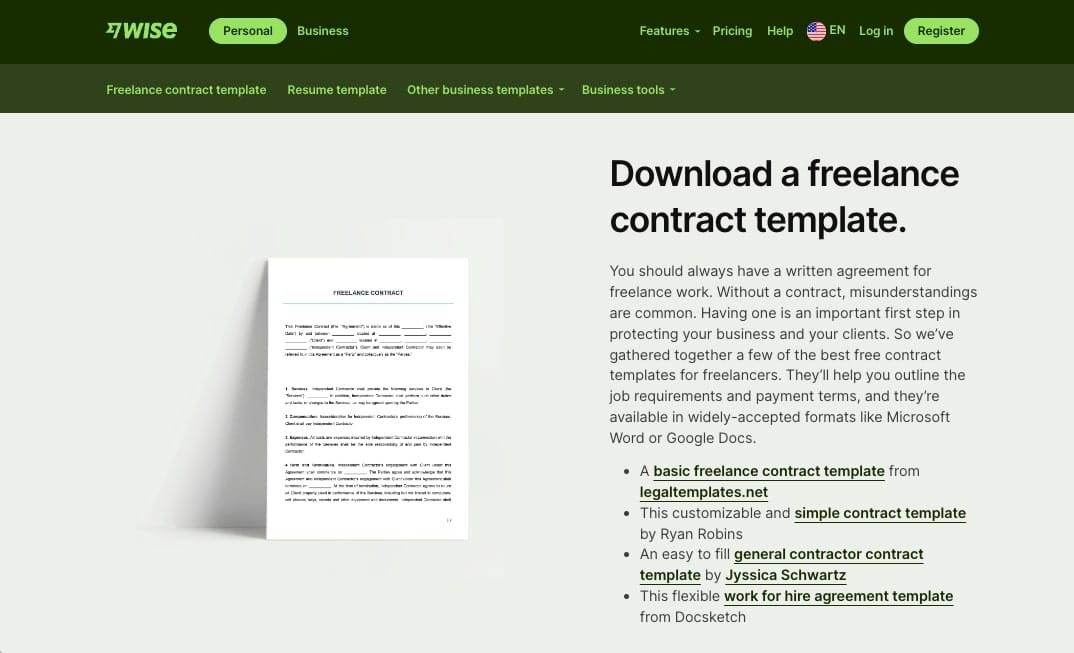
A general service contract is a good choice when you need a clear and standardized framework that works for most scenarios.
The beauty of a freelance contract template lies in the fact that you can adapt and adjust it around different scenarios. A general service contract gives you a solid and reliable base so that you can add and subtract what you need.
If you’re new to freelancing, a general service contract should be your first choice. They’re a great starting point that you can build upon as you learn about your industry, clients, and typical scenarios.
Another big plus point about general service contracts is that they don’t use as many niche legal terms and industry jargon. They’re simple and straight to the point, which is just what you need when you’re starting out.
Wise has an excellent general service contract that will suit a wide array of freelance workers.
2. Consulting service agreement
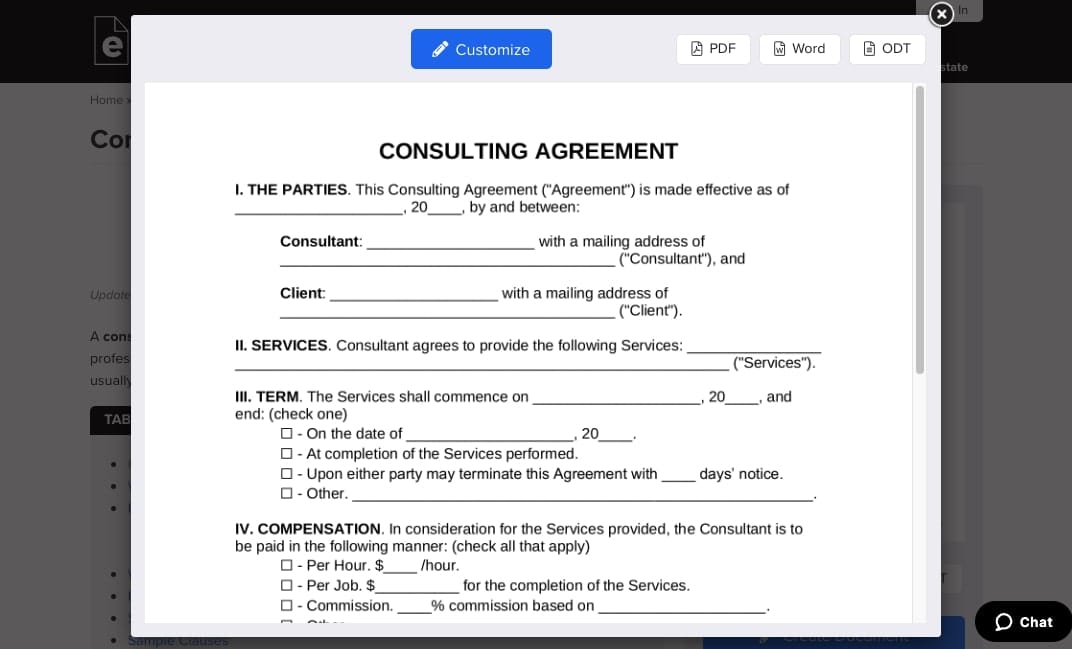
Consulting services are a particular type of freelance work. The services that you offer can be dramatically different in both focus and scope than, for example, copywriting or web development. As such, any template needs to reflect these differences.
One of the big differences you need to think about is deliverables. A consultant looks at the client's business, diagnoses issues, and makes recommendations for a change in strategy or other improvements. In short, a consultant is not responsible for executing these changes, unlike many other types of freelance work.
What’s more, the scope of a consulting project can be very broad. These tasks are collaborative and may involve a lot of market research, interviews, and analysis. A good consulting service agreement needs room to acknowledge and bill this work.
Finally, many consultants charge a retainer to start the work. Your contract should make this clear and enforceable.
eForms offers an excellent consulting service agreement template. You can select from a wide range of industries and different payment types. Best of all, it also includes a section that allows you to add a retainer, which is essential for certain consulting projects.
3. Design services contract
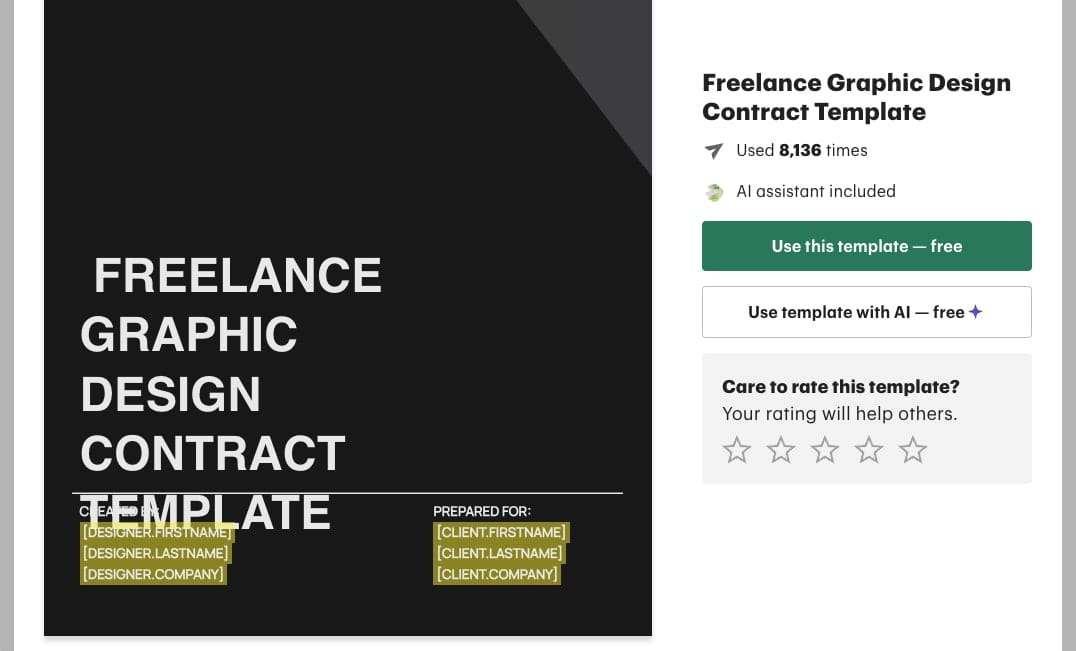
Design services can involve a more complex scope of work when compared to freelance contracts. Often, you need to account for research, conceptualization, prototypes, and so on. What’s more, you need to outline intellectual property (IP) agreements, revisions, and kill fees.
Change orders are another vital element of a design services contract. Quite often, these projects can change and evolve, so your contract needs a way to track and acknowledge how these changes affect both billing and timelines.
PandaDoc offers a great design services contract with a big focus on deliverables. It also allows you to add a deposit and adapt to situations when the scope of work changes.
4. Marketing services contract
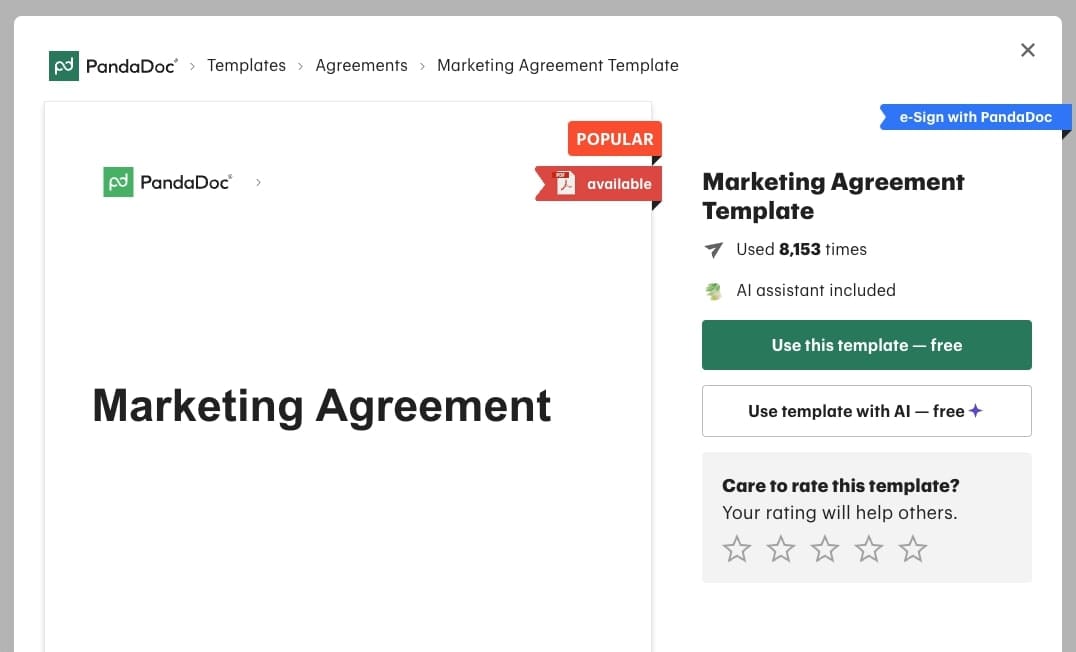
A typical freelance service contract is focused on an easily measured task, such as writing an article. On the other hand, a marketing services contract might include a broader set of activities, like developing strategies, creating content, managing campaigns, and so on. As such, a marketing service contract will need more itemization.
PandaDoc has an excellent digital marketing service contract. It has all the sections you need for a marketing agreement, including things like a limitation of liability, non-compete agreements, and sections covering NDAs and IP clauses.
5. Accounting services contract
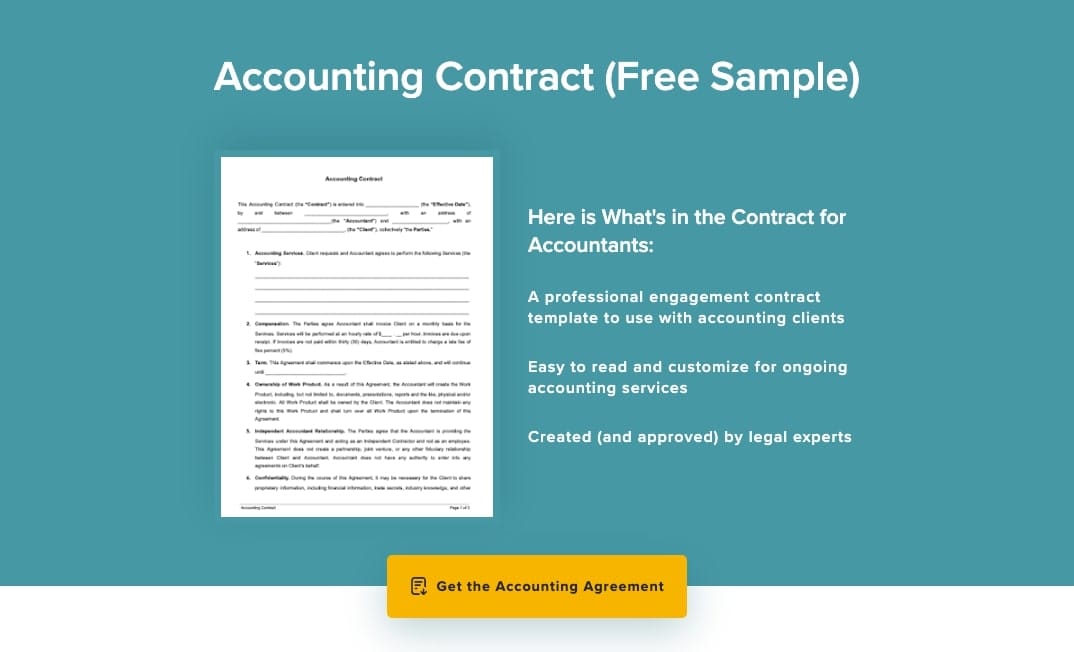
Accounting services contracts are far more complex than standard freelance agreements. For example, an accounting services contract needs to acknowledge the following:
- The accountant meets compliance standards like GAAP or IFRS.
- Adherence to confidentiality and data security standards.
- Accounting errors can lead to financial losses, so contracts should include either liability limitations or details of professional indemnity insurance.
The scope of an accountant's work is also quite broad. An ongoing freelance accounting contract must detail expectations, from booking to tax preparation to audits and financial statements. Some of this work needs to be done weekly and monthly, while other tasks are annual or ad-hoc in nature. Any contract should make the differences crystal clear.
Signwell offers a detailed and thorough accounting service contract that covers all the eventualities you might encounter when working as a freelance accountant.
6. Web development services contract
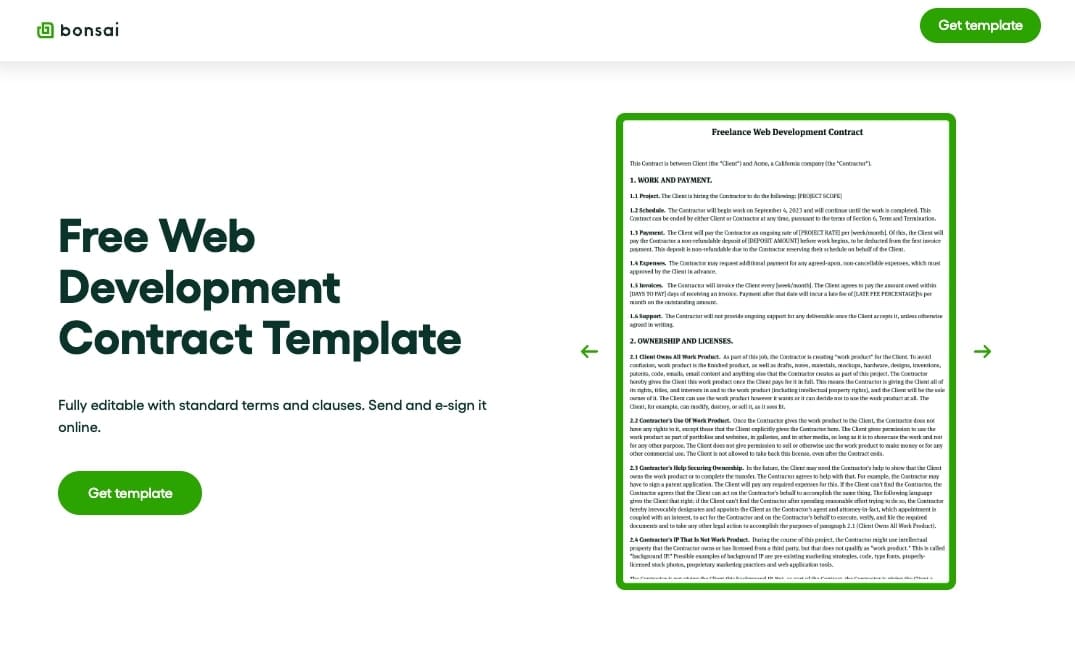
Web development has its own intricacies that need to be represented within your contract. Aside from the scope of work and IP sections, web development involves technical requirements and standards, which should be clear in your contract. For example, coding languages and frameworks, performance benchmarks, hosting provisions, and so on.
What’s more, you need to think about things like web testing, maintenance, and support. All of these considerations should be included in your contract.
Bonsai has a rock-solid web development services contract. It includes a clear breakdown of all the potential stakeholders involved, plus detailed stages of the web development life cycle.
7. Copywriting services contract
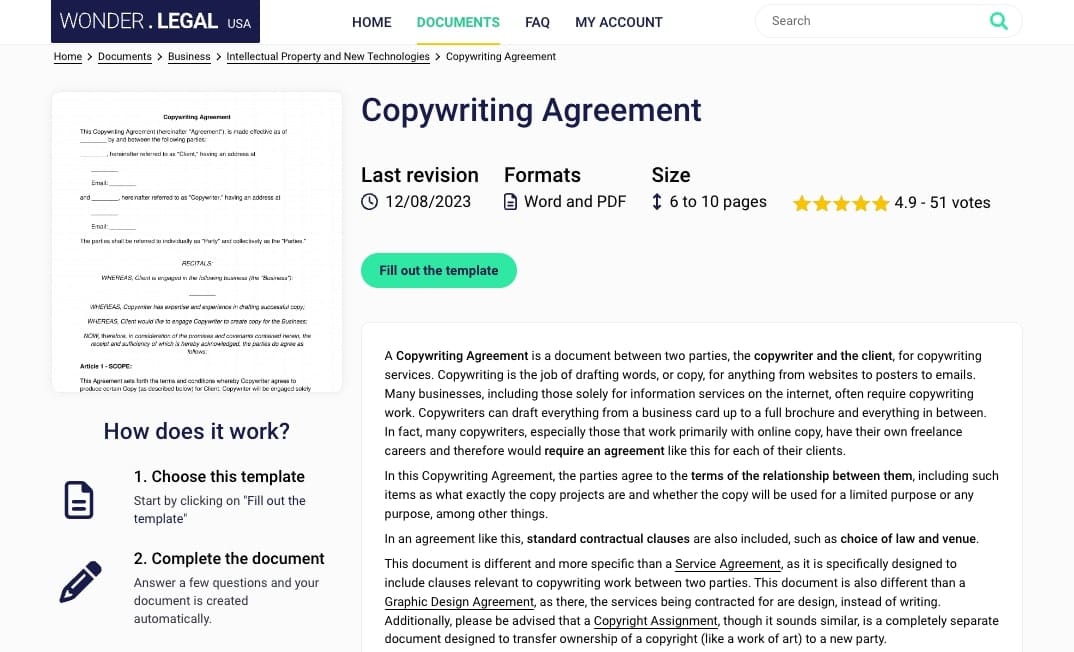
A copywriting services contract can vary greatly in complexity depending on the scenario. At its simplest, these agreements might just specify a few milestones, some IP clauses, and payment details. However, for more complex situations, you’ll need to think about things like retainers, performance considerations, and, in rare cases, royalties.
Most copywriting contracts will use the work as the deliverable. However, in direct marketing situations, the effectiveness of your copywriting is objectively measured through replies and sales. As such, your copywriting contract should outline how success is measured (clicks, leads, revenues) and what level of compensation you are due if your copy hits these milestones.
With most copywriting contracts, you’ll need to specify how you can deal with revisions. As a freelance writer, you’ll know that sometimes it takes a few goes to really hit the mark. Your contract should make it clear how many revisions are part of your original fee and include provisions if you need to submit new drafts.
Wonder Legal has a solid copywriting services contract that will fit the bill for most scenarios.
Create and send contracts with Assembly
Assembly’s Contracts App is a powerful solution for freelance contracts. The app allows you to create and edit contract templates with a simple drag-and-drop interface.
What makes our contract templates great is that you can integrate them with our e-signature functions to create dynamic documents thanks to elegant autofill functions. So, for example, you can pull details from your CRM when you send the document, which helps populate the contract with the client's name, address, and other relevant details.
From there, you can send your contract to your client via Assembly. They will receive an email notification that prompts them to complete the contract. You will be kept up to date with everything through your dashboard.
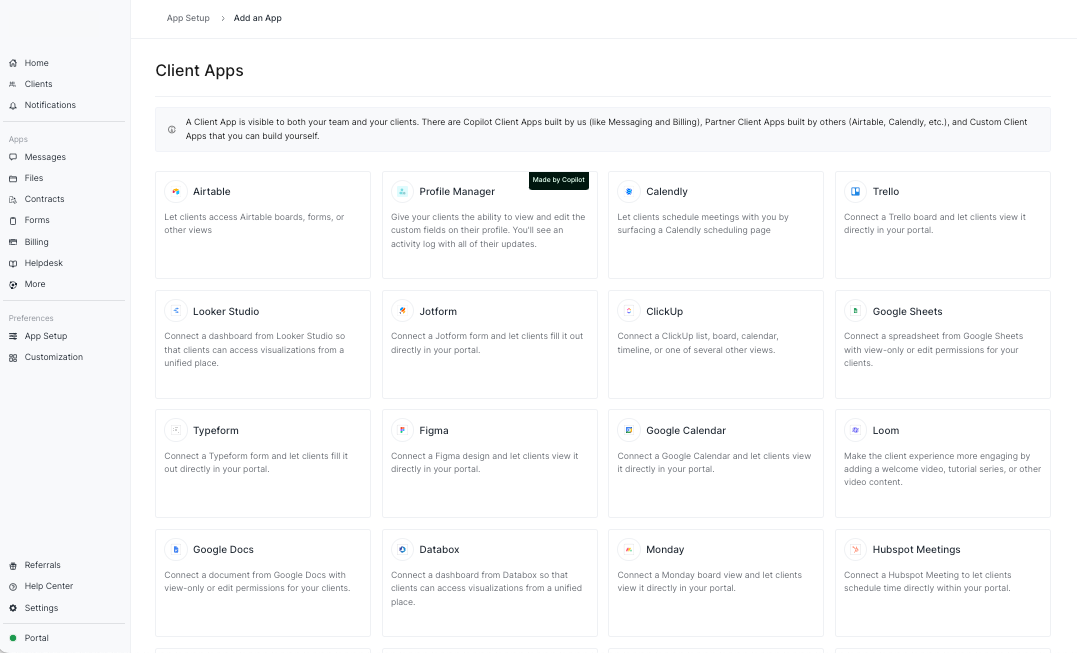
However, the real power of the Contract App lies in its ability to integrate with various workflows. Assembly is all about creating seamless onboarding experiences.
The Contract API is built with a robust API, which means you can do things like trigger the sending of a contract to a client based on specific actions, such as signing up for your product. Similarly, you can use the signing of the contract as a trigger for certain actions, like pulling data from the contract and updating your CRM so that you can provide more personalized communication.
While the Contracts App is an excellent feature on its own, when placed inside Assembly’s broader offer, it forms part of a solid solution for onboarding, engaging, and retaining service clients.
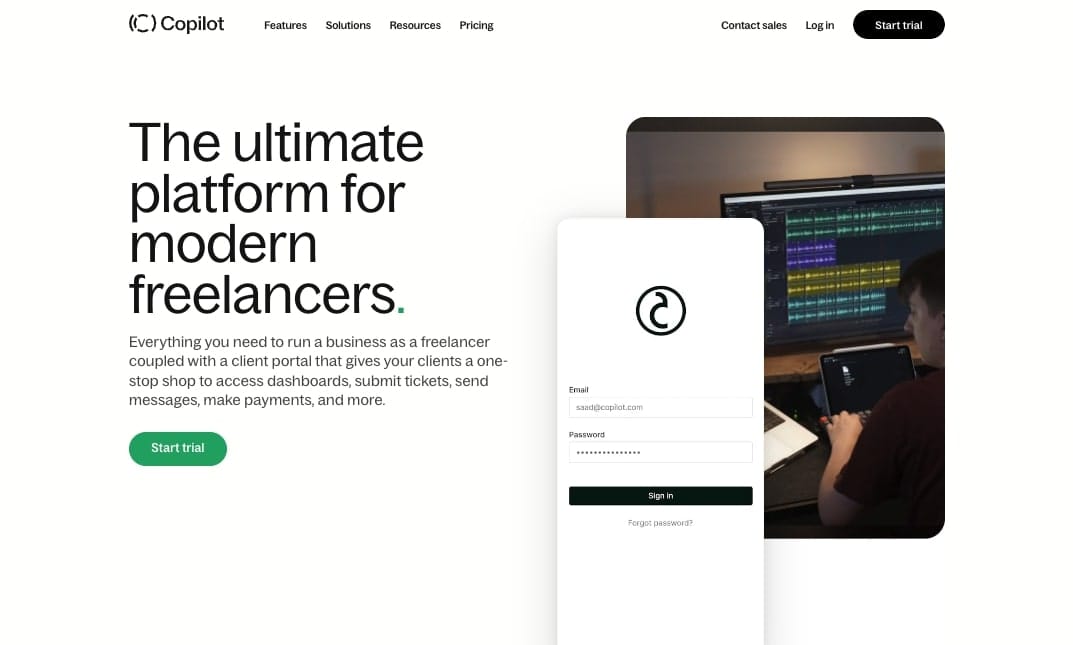
The Assembly client portal allows you to build onboarding forms that help you get the information you need to develop tighter bonds with your clients.
From there, clients can also send important messages and access a wide variety of documents. Centralizing your communications like this means that you don’t have to juggle email and direct messages and that no important information is missed.
Assembly also allows you to connect with your project management tools, meaning you can keep clients updated on the status of projects in the portal. Finally, Assembly also allows your clients to pay their invoices directly from the portal. You can even automate reminders so that delays are a thing of the past.
Contracts are just the start of your client relationship. Assembly helps you get off on the right foot by providing a secure and professional environment in which to share and sign contracts. From there, meeting your client's expectations involves providing a smooth communication experience and delivering on what you promise. Assembly helps you with the former, but the rest is on you. You’ve got this.

